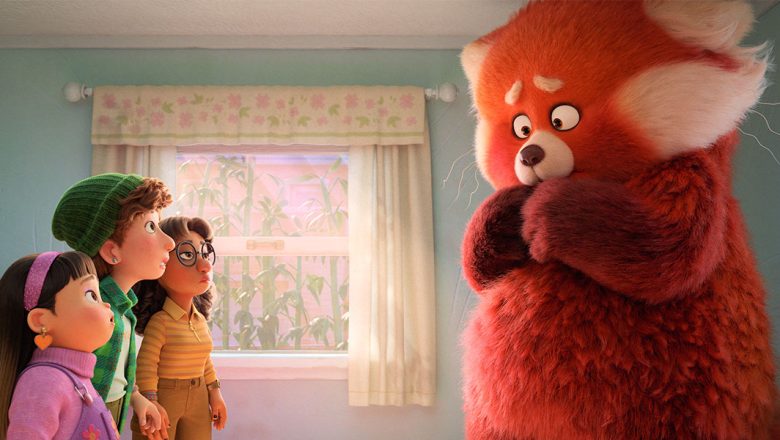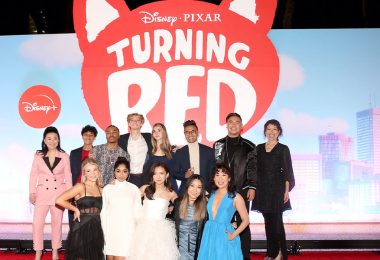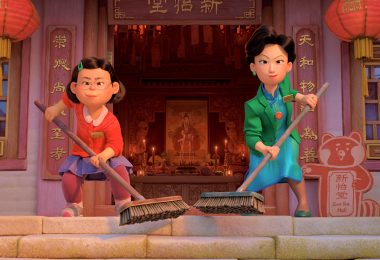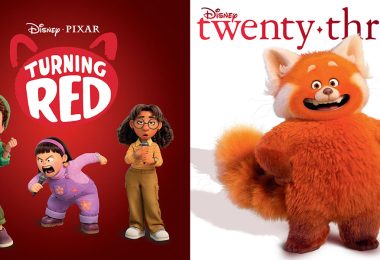By Courtney Potter
Disney and Pixar’s Turning Red follows Mei Lee (voice of Rosalie Chiang), a confident, dorky 13-year-old growing up in 2000s Toronto, Canada, as she’s torn between staying a dutiful daughter and the chaos of adolescence. Ming (voice of Sandra Oh), her protective (if not slightly overbearing) mother, is never far away… an unfortunate reality for the teenager. And as if changes to her interests, a.k.a. her utter devotion to the film’s uber-popular boy band 4*Town; her relationships, including those with BFFs Miriam (voice of Ava Morse), Priya (voice of Maitreyi Ramakrishnan), and Abby (voice of Hyein Park); and her body weren’t enough, whenever Mei gets too excited (which is practically ALWAYS), she “poofs” into a giant, albeit seriously adorable, red panda!
Directed by Domee Shi, who helmed 2018’s Oscar®-winning animated short Bao, and produced by Lindsey Collins—with a screenplay by Shi and Julia Cho—Turning Red will “poof” its way onto Disney+ beginning in just over a week. To celebrate the film’s impending debut, the voice cast and the filmmakers gathered for a rollicking virtual press conference, where they shared some terrific “tails” and meaningful memories about their experiences making the film.
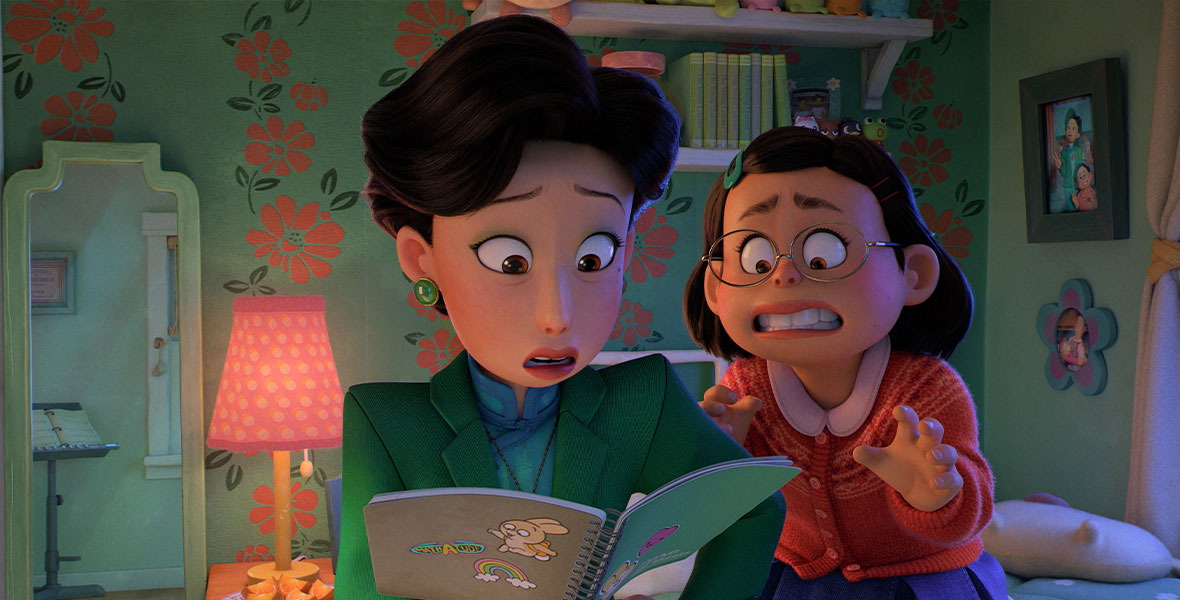
Chiang on discovering how much Mei’s life resembles her own—amazingly so:
“After watching a movie, my mom and I looked at each other and said, ‘This is really similar,’” the newcomer explains. “There are so many odd, really weird coincidences. First of all, my mom’s middle name is Ming. There’s no way they could have known that! And my favorite animals were actually red pandas—before the whole project even started. But the main thing is that my mom, since way before this project, actually calls me Mei Mei! It means ‘little sister’ in Chinese… So, when [Ming in the film] says, ‘Oh, perfect little Mei Mei,’ I’m like, ‘Hey, that’s what I literally went through!”
Oh on the importance of two kinds of relationships—those with friends and those with parents:
“Having young women and young girls in my life, and watching television and films with them over the years, you just realize, ‘I don’t know who sets this up—that girls are [catty]—because I don’t think it’s true,” the Golden Globe® winner explains. “And I think this film is an extremely good representation of deep friendships, the highs and the lows. I have relationships and friendships that are 40 years old. What I love about this film, through the friendships and also the music, is it [shows] that precious time when you’re starting to figure out who you are, when your friends become really, really important.”
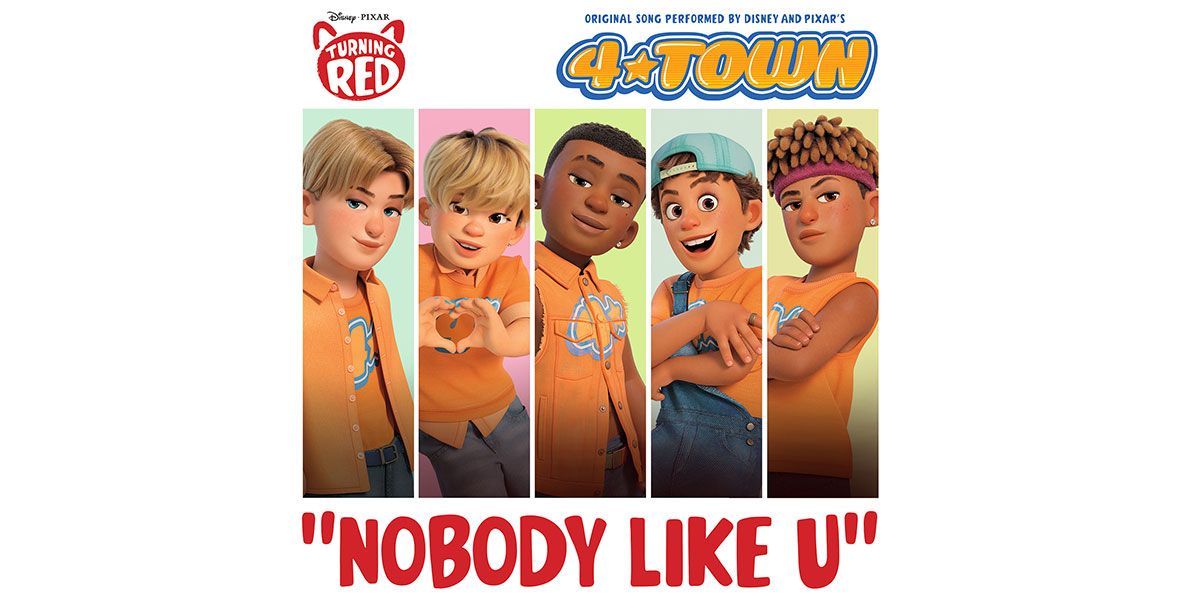
Collins on asking Billie Eilish and FINNEAS to create 4*Town’s songs:
“At one point we were like, ‘All right, who’s gonna write the music—and who do we approach?’” the producer says. “I have three teens at home and they’re listening to music constantly. And Billie and Finneas’ music was being played all the time in my house; they were clearly people who were speaking to this generation… So, we thought, ‘Well, let’s ask.’ It felt ridiculous at the time—it’s such a weird ask. They’re super popular. I didn’t even think they were gonna take the meeting. But I think maybe because it was such a weird ask—it wasn’t, ‘Oh, sing us a song’; it was, ‘Can you write boy band songs for us?’—they were intrigued. We went down and pitched it to them, in person. And before the meeting ended, they were like, ‘We’re in!’ It was huge. It was a gift, really.”
Ramakrishnan on her own 4*Town-esque concert experience:
“I remember—and this is gonna be very Canadian of me—going into grade nine, going into high school, and that summer before, I went to my first concert,” she admits. “I went to see [Canadian pop group] Marianas Trench and I lost my mind! I was always wondering, ‘Why do people cry at a concert? Shouldn’t you be excited to be there?’ You would be smiling, maybe laughing, who knows. But then as soon as they came out on stage I was bawling, and I thought, ‘I understand now. I understand why I was so emotional.’ I didn’t know exactlywhy, but it just made sense. The importance of music, growing up—it totally shapes who you are.”
Morse on coming to her character from an authentically teenage standpoint, and what she loves about Miriam:
“I’m currently a high school student,” she explains, “and everybody is just growing and changing together. It can be very stressful and even dark at times, ’cause everyone is going through a lot, and not everyone knows how to handle that. But at the same time, it’s kind of a beautiful thing. Everybody’s in that together and putting their all into living their lives the best they can… I was really inspired by my own friends, putting them into Miriam herself; she is such a supportive and amazing friend to Mei and the other girls. My friends are so supportive and always there for me, no matter what, so I thought it was really cool to kind of ‘give back’ in that way.
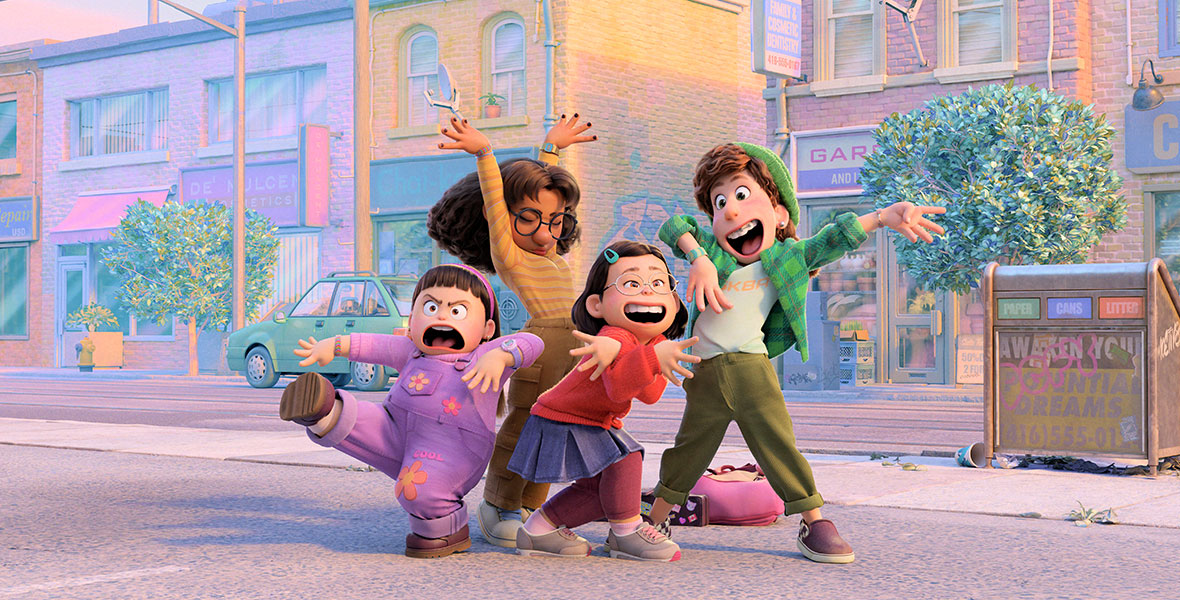
Cho recalls collaborating with Shi on the screenplay:
“It was really a joy to be able to embrace all of my own self in the writing of this,” she admits, “and having partners who loved it. We would always encourage each other to bring more and more of ourselves into it. One of the things Domee and I really connected on, pretty early, was the fact that we both grew up really tight with our moms in a way that was beyond culture, beyond anything—it’s just the way we personally developed these relationships with two women who are very strong in very different ways. I think that for us, the story was also—in that sense of transition—going from a girl whose mom is your whole world to a young woman who’s starting to learn to be independent, and how scary that is… The fact [is] our moms are still very much a part of our lives, but we had to find a newrelationship with them. So, I think a lot of that definitely went into this story, and into these characters.”
Shi on advice for other women directors, and what she hopes audiences—especially young girls—take away from the film:
“Being able to find a support system and a community at Pixar, that was so valuable for me—and really built my confidence and my voice as a filmmaker and a storyteller,” the director explains. “When I first started at Pixar, there were four or five women in the story department—and we started having lunches together and sharing stories. I remember this one lunch where we all went around and said our goals out loud—and that was the first time that I actually said, aloud, ‘I want to direct!’ Then I was embarrassed and thought, ‘Oh no. Why did I say that?’ But everyone responded, ‘Yeah, yeah, yeah!’ And I think just saying it and putting it out there—and being with people that support and validate you—that can make you not feel so alone… That was huge for me.”
“The inspiration behind Turning Red just came from my own life—growing up in the early aughts as a Chinese Canadian dorky, sassy, nerdy girl who thought she had everything under control,” she continues. “She was her mom’s good little girl. And then boom, puberty hit. And I was bigger. I was hairier. I was hungry all the time. I was a hormonal mess and I was fighting with my mom like every other day. Making this film was kind of my chance to go back to that time—to make [something] for 13-year-old me, the teenager who thought, ‘What’s happening to me? No one’s telling me anything!’ I think it’s so cool that audiences can take comfort in the story, but it’ll also make them laugh as well.”
See Disney and Pixar’s Turning Red on Disney+ beginning Friday, March 11!



